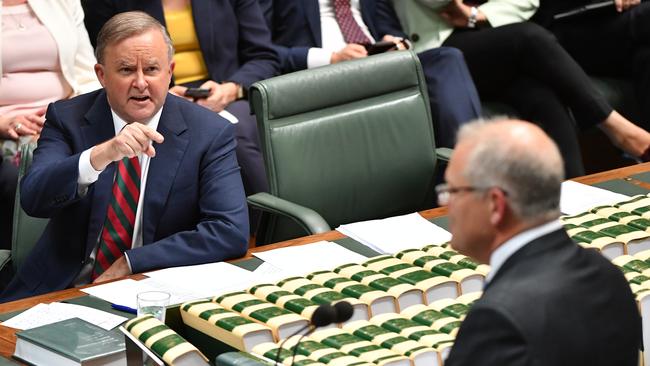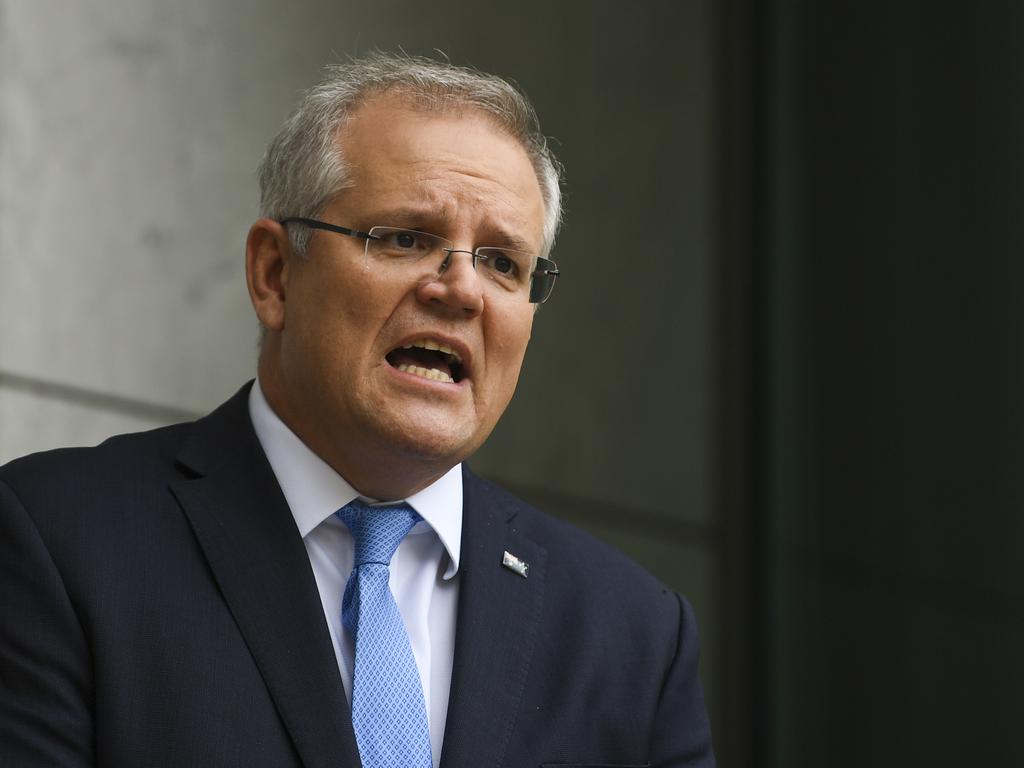
The opposition says it wants to be “constructive and co-operative” and it has demonstrated some great moments of bipartisanship, but the bitter anger of the election campaign and Labor’s defeat seem to be driving political actions very different from the stated aim.
Unlike Scott Morrison, Anthony Albanese and his colleagues appear unable to evolve during an unprecedented global crisis. Labor doesn’t seem to know what to say, or to whom it is speaking.
The ALP’s great advantage of calling for a wage subsidy has been undermined by its threat to block it; and the Prime Minister has come at Labor from the left, surprising his conservative supporters, and won historically high personal support.
That “crisis high” approval in the latest Newspoll, in line with John Howard’s during the terror attacks and Kevin Rudd’s during the global financial crisis, includes Labor voters who heartily endorse the government plan.
By being apolitical at a time of crisis, Morrison — declaring there are “no reds or blues” — has demonstrated a superior political mind and shown a genuine concern that is enhancing his stature.
Labor’s threat to the $130bn JobKeeper proposal is not only the acme of this misreading of the public’s mood, it is the epitome.
It says it supports it, that it suggested it and wants it passed through parliament’s special sitting on Wednesday, but the explicit threat to the depression-busting plan is to adopt the ACTU’s legalistic, ideological arguments about theoretical losses of entitlements and join the Greens and independents to essentially block the plan if it is not drastically altered.
Like all of Labor’s arguments, this is based on a belief that Morrison, the Treasury, health officials and the national cabinet are wrong and the opposition has the answer it can implement in parliament.
It is also a Labor solution looking to union tenets of faith and seemingly uncomprehending of the depth of public concern about the virus and job losses.
Labor’s bitter edge has also been directed personally at Morrison and his ministers because the ALP had failed to damage his personal profile before the election. Labor’s position at the start of the crisis was to disagree with the strategy of Morrison and the national cabinet, including its five Labor leaders, and the Chief Medical Officer, to work on “flattening the curve” and addressing the twin crises of health and the economy.
There was also a deeply contradictory approach to criticism of the national cabinet, given there were calls to appoint the Opposition Leader to it — calls that have been replaced with an insistence on weekly sittings of parliament.
Labor insisted there were no twin crises, that the priority had to be health, that governments had to “go hard, go early”, introduce coronavirus tests for everyone with symptoms and not be so concerned with the economic future.
Albanese, Richard Marles as deputy leader and Chris Bowen as health spokesman all demanded more testing, saying Australia should treat health aspects as the priority, while suggesting the testing regime was insufficient and less than South Korea’s.
The rhetoric about there not being twin crises has evaporated from the Labor team, and as the “curve flattens” and Australia has one of the highest per capita testing regimes in the world, there is much less “go hard, go early”.
The debacle of the disembarkation from the Ruby Princess was also sheeted home to Morrison and Peter Dutton by Labor’s Senate deputy leader, Kristina Keneally, who said it was a failure of the national cabinet processes.
Morrison and Home Affairs Minister Dutton were careful not to blame Gladys Berejiklian and rupture the commonwealth/states co-operation, but Keneally’s taunts look highly political and just a bit embarrassing now.
For days, Labor lambasted Morrison and the national cabinet for limiting haircuts to 30 minutes and then reversing the decision, to save jobs, within 12 hours. Again, it focused on mixed messaging, political points and details.
Tony Burke on Sunday encapsulated Labor’s attitude and approach: “With respect to amendments to the Fair Work Act, we know what a smart way to do it is and the government appears to be going down a different path.”
Yes, it is. But it’s a path that has overwhelming public support. Given the “different paths” Labor has advocated and dropped, it may be time for it to become less political and more upbeat instead of seeking relevance in criticism.








Labor has got the politics of the COVID-19 crisis wrong from the beginning: its tone, attitude and tactics have been aggressive and negative.